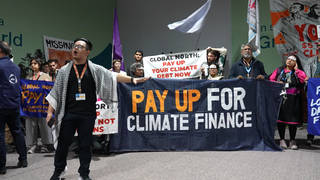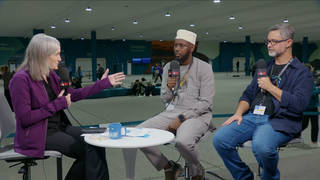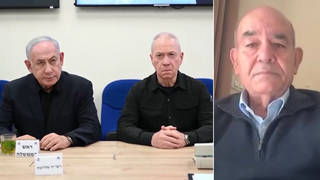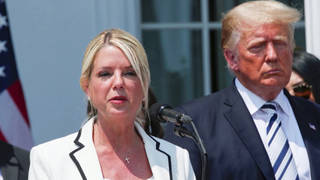
Related
Guests
- Jonathan Steelelongtime correspondent for The Guardian newspaper. He has reported from Afghanistan since 1981. His new book is called Ghosts of Afghanistan: The Haunted Battleground.
The U.S.-led war in Afghanistan, now entering its 11th year, shows no sign of ending. On Saturday, 12 U.S. soldiers died in a suicide bombing in Kabul. It was deadliest single ground attack against NATO forces in the decade of war. To discuss Afghanistan, we speak with Jonathan Steele, a longtime correspondent for The Guardian newspaper and author of the new book, “Ghosts of Afghanistan: The Haunted Battleground.” “The [U.S. military strategy] doesn’t work, because you create new resistance by being there. The resistance comes because you’re there; you’re not there because of the resistance. The occupying force itself creates the resistance,” Steele said. “And so, the crucial thing now is to recognize that the war is unwinnable. It’s a stalemate. There is no military victory.” [includes rush transcript]
Transcript
AMY GOODMAN: On the heels of a suicide bombing in Kabul on Saturday that killed 12 Americans, a Canadian and four Afghans, and similar attack on Monday in Kandahar that killed three U.N. workers and two others, the Obama administration says it’s launched a revised strategy to end the decade-long war in Afghanistan. According to a report in the Washington Post, elements of the strategy already underway include escalation of military pressure on the Haqqani network of insurgents, along with an open door for the network and other Taliban groups to hold direct talks with the U.S.
In other Afghan news, evidence has emerged the U.S. continued to transfer prisoners to Afghan prisons despite knowing of widespread torture there. Afghan and Western officials interviewed by the Washington Post confirmed the U.S. both transferred prisoners to torture-linked prisons and later visited them there for interrogation.
To discuss Afghanistan, I recently sat down with Jonathan Steele, longtime correspondent for the British Guardian newspaper who has reported from Afghanistan since 1981. Steele’s new book, Ghosts of Afghanistan: The Haunted Battleground, tackles the myths that he says have made it nearly impossible for the U.S. to construct a sensible strategy in the country or help build a viable Afghan state after three decades of war and foreign intervention.
I began by asking Jonathan Steele about recently disclosed U.N. investigation that uncovered, quote, the “systematic” torture of prisoners by Afghan forces.
JONATHAN STEELE: The U.S. either knew—and I’m pretty sure they did know—or they deliberately didn’t want to know—they turned a blind eye to it—because they’re funding these ministries and the prison system of Afghanistan, allegedly in order to try and reform them. And they were turning a blind eye to these incredible abuses that were going on there.
AMY GOODMAN: I wanted to play a clip, as the media takes this on and says this is an outrage that we’re funding a security force in Afghanistan that tortures people, of a prisoner who was a prisoner in U.S. hands, Moazzam Begg. You know him—
JONATHAN STEELE: Of course.
AMY GOODMAN: —because he lived in Britain. This is a comment of Moazzam Begg, the British citizen, who was born in Birmingham. In February of 2002, he was seized by the CIA in Islamabad, then held at Guantánamo. Democracy Now! went to London to see him five years later, when he was released back to Britain. He talked about his experience.
MOAZZAM BEGG: So that when I was eventually given into American custody and taken over to Kandahar, the treatment that I received through the processing was probably the most dehumanizing process, I think, that anybody has ever endured in recent times, which included having soldiers sit on me and then many other detainees, several of them pushing down on my head and my legs and my back, ripping open my clothes with a knife, which I could feel slicing, the cold blade against the back of my legs and back, and then photographs being taken of me naked, being shackled, being spat at, photographs of me shaven and unshaven, photographs of soldiers abusing me and other detainees, and derisive remarks about being a terrorist, being a murderer, being Muslim scum, things like this, dogs barking, and then eventually being taken over to an FBI agent who looked rather strange with his FBI cap on, while I’m shivering there naked, and him asking me when was the last time I saw Mullah Omar, when was the last time I saw Osama bin Laden, which was a standard question they asked of every detainee.
AMY GOODMAN: That was Moazzam Begg, who was held for years by the U.S. military. He was describing his experience when he was brought to Kandahar. Then he was brought to Guantánamo, held for years, never charged, and ultimately released, now resides back in Britain. Jonathan Steele, as I listened to the pundits today, asking this question, “How could we support Afghanistan? What have they learned? Why don’t they—why haven’t they learned from our training?” it sounds like that’s exactly what they’ve learned from our training.
JONATHAN STEELE: Exactly. I think it’s really good that you’ve shown that interview, because it—they’re learning from Guantánamo. Guantánamo preceded all this abuse that we’re now hearing about. So, it’s been a two-way street. It’s not a question of the Afghans doing this on their own.
AMY GOODMAN: Let’s talk about what is happening today in Afghanistan. You have covered it for 30 years. What should we understand today about what is happening there?
JONATHAN STEELE: Well, two days after 9/11, I wrote a column in The Guardian saying that if the U.S. reaction was to put boots on the ground in Afghanistan and try to occupy that country and to bring about regime change, they would suffer exactly the same fate as the Soviet Union. And I’m afraid to say that I’ve been proved right on that, because they’re following exactly the same techniques as the Russians. It’s what I call the garrison strategy. You hold the main cities, you try and keep the roads going open between them, and you make little forays into the countryside and try and push out a bit. But it doesn’t work, because you create new resistance by being there. The resistance comes because you’re there; you’re not there because of the resistance. The occupying force itself creates the resistance.
And so, the crucial thing now is to recognize that the war is unwinnable. It is a stalemate. There is no military victory. And this is the lesson that I’m afraid President Obama hasn’t yet learned from what the Soviets did, because Mikhail Gorbachev came into power in the Kremlin in 1985, after five years of war, when 9,000 Soviets soldiers had already died. He inherited somebody else’s war from his predecessor. And he realized immediately that the war was unwinnable. He consulted his military. They also said the war is unwinnable. They didn’t say, “We want a surge.” They didn’t say, “We want new troops, new equipment, you know, more scope, more money.” They recognized that the thing is a disaster. Obama hasn’t yet recognized that. And in fact it’s worse than that, because people like General Petraeus are still convinced that there can be a military victory. He has the ear of the President. He’s the head of the CIA, sees him virtually every day. And so, it’s really important, I think, that the American public—and we know from the polls that more than half are against this war—really make their voice heard.
AMY GOODMAN: I wanted to turn to the former head of U.S. and NATO forces in Afghanistan, General Stanley McChrystal. Speaking at the Council on Foreign Relations earlier this month, McChrystal said the U.S. invaded Afghanistan with what he called a “frighteningly simplistic” understanding of the country that continues to this day.
GEN. STANLEY McCHRYSTAL: We didn’t know enough, and we still don’t know enough. Most of us, me included, had a very superficial understanding of the situation and history, and we had a frighteningly simplistic view of recent history, the last 50 years, the personalities, the actions that occurred. Many people thought, well, they fought the Soviets, they defeated the Soviets, and then there was this Taliban period, and then we came in 2001. But there were so many forces at play and so many personalities in the seven different Mujahideen groups, so many different actions that complicated, that when we arrived, I think we were woefully underinformed.
AMY GOODMAN: That was General Stanley McChrystal. Jonathan Steele?
JONATHAN STEELE: Well, it’s an amazing admission. I mean, I think he speaks for everybody in the administration. He’s at least had the honesty to say that. I mean, the people who took this decision to go to war, it was very similar to Iraq, in fact. It was done out of complete ignorance, without any real thinking about what happens on day two. First, you topple the regime. Then what do you do? You end up occupying the country, trying this nation building, and resistance grows, and eventually you’re forced to withdraw.
AMY GOODMAN: I wanted to ask you about Brzezinski’s famous comments to a French newspaper years ago, when talking about why the Soviets even entered Afghanistan, wanting—the U.S. wanting to embroil them in their own kind of Vietnam, saying, “What’s a few riled-up Muslims?” and so, the U.S. supporting the Mujahideen. Among them that were trained was Osama bin Laden. And then the blowback effect afterwards: first they set their sights on the Soviet Union, then they set their sights on the United States. But how the Soviet Union first went in, take us through that whole trajectory, as you were just describing when Gorbachev decided to pull out, and then the U.S. getting involved themselves, and what the alternative was and is.
JONATHAN STEELE: Well, that’s really the incredible thing, because Americans know what happened when the Russians were there, because they were arming the Mujahideen. And so then to invade themselves and think that they could do differently from the Russians is just absurd. I mean, it’s just crazy.
The real problem was that they conflated the Taliban and al-Qaeda. It was a marriage of convenience between the Taliban and al-Qaeda. And as soon as 9/11 happened, Osama bin Laden moved from his Kandahar area, where he was relatively visible, to the Tora Bora mountains, so that when Bush came along and said to the Taliban, “You have got to hand Osama over to us, or we’re going to invade,” it was a completely unrealistic demand. I mean, it’s taken the United States nine years to find Osama. How could the Taliban, who don’t have night vision equipment, don’t have satellites, don’t have drones—how could they have located him in Tora Bora at that stage? It was completely unreal. Osama was out of their control. But he—
AMY GOODMAN: Not to mention, ultimately, out of their country.
JONATHAN STEELE: Out of—and then, of course, he moved out of the country, and al-Qaeda has been dispersed. It’s stronger than it was in 2001, because it’s gotten more recruits, partly because of these constant invasions—Iraq and Afghanistan—that fires people up and gets them angry.
AMY GOODMAN: You say al-Qaeda is stronger than it is—than it was in 2001 now?
JONATHAN STEELE: Well, I think it’s got more people around. And it’s dispersed. It’s in Pakistan. It’s in Somalia. It’s in Yemen. It’s in North Africa. It was in Iraq for a time during the last five years. And so—so I think it’s got more recruits. Maybe they’re not as effective as they were, and certainly Homeland Security is much better. And that’s what the reaction to 9/11 should have been: improve Homeland Security, but don’t start intervening in Afghanistan.
AMY GOODMAN: What do the Taliban want now?
JONATHAN STEELE: The Taliban, I think, have changed their line enormously. Mullah Mohammed Omar, at the end of Ramadan, six weeks or so ago, put out a very important statement, in which he said, in terms, “We do not want a monopoly of power in Afghanistan.” That’s a complete change. In 1996, when they came in, they did have that. He said, “We respect all the ethnicities of Afghanistan, and we want them to develop together.” He represents largely a Pashtun constituency, and the Tajiks, who are the other second-largest ethnicity, are quite worried. But from what Omar is saying, he’s trying to reassure them. He even talked about foreign investment, bringing investment—he said, “We’ve got mineral wealth, and so on, that must be developed.” So he’s completely changed his line.
So I think he wants to come into a process of talks. And I think this is really what needs to happen now. I think Obama should now make a declaration that there’s going to be a complete change of course, that the war is unwinnable, we are now moving towards negotiations, and that our goal now is a government of national unity in Afghanistan which will include all the insurgent groups, every kind of group, and it will make a pledge, of course, that it will not harbor al-Qaeda or any other global terrorist group in its country. And I think he has to lift the bounty on Mullah Mohammed Omar’s head. You cannot negotiate with somebody if you’re threatening to kill them and to give ransom—to give money to people who arrest him. So he has to really make a completely radical shift in policy and recognize that the interlocutor on the Taliban has to be Mullah Mohammed Omar or whoever he chooses to appoint as his negotiator.
AMY GOODMAN: And who is Mullah Mohammed Omar?
JONATHAN STEELE: He is somebody who grew up in the resistance to the Soviet Union. He was part of the jihad, as they called it at that time, the Mujahideen, against the Russians. But he was of a younger generation from the Kandahar area. And like many of these young fundamentalists who fought against the occupier in the 1980s, which was the Russians, he became very disillusioned with the older generation when they finally took power in 1992, because they started a terrible civil war in Kabul. Fifty thousand people were killed, just by shelling from one district to another of Kabul. And there was a lot of corruption. And Mullah Mohammed Omar was really one of these sort of young puritans, if you like, who said, you know, “We want to clean out these corrupt leaders and bring in a more honest and legitimate kind of Islam.”
Of course, they’re very hard-line in terms of women’s rights, and nobody can, you know, accept that. But that doesn’t start with the Taliban. The whole point that I’m trying to make in this book, which confronts 13 well-held Western myths about Afghanistan, is that women’s oppression long predated the Taliban, unfortunately, and it’s continuing in areas of Afghanistan where the Taliban have no control at all. So this is a fundamental, traditional policy or practice and custom, which will take a long time to change and move forward. But it’s not as though the Taliban came in and started women’s oppression.
AMY GOODMAN: And yet, it is so often used in the United States as the reason the U.S. cannot leave. President Bush’s—his wife, the First Lady, Laura Bush, talked about Afghanistan, the United States being there to free women. And that continues through to this day.
JONATHAN STEELE: Yes. I mean, I don’t know whether it was done entirely cynically. But if you follow the kind of scenario I laid out in the beginning, that they were really trying to go after al-Qaeda, but they knew it was going to be difficult. They thought it was an easy hit to get rid of the Taliban, because they were a sitting target. So, instead of hitting the bullseye, they knew that the dart would go somewhere on the board, and that was good enough, because they could say, “OK, we’ve toppled the Taliban. We’ve liberated women. They’re throwing off the burqa. Everything is fine. We’re bringing humanitarian conditions and development to Afghanistan.” And that would pacify the antiwar opposition. And in fact, it did, of course. Many people said, “Well, OK. They haven’t found Osama, but at least it’s better for Afghans.”
And I think if you talk to Afghans now, as I do, you know, they have very mixed feelings about that, even women now, many of them saying that the fundamental thing in Afghanistan is security, to get away from these car bombs, suicide attacks, drone attacks and so on, and the war everywhere, and particularly in the villages. And that is the overriding thing, is to have peace, because peace is the biggest human right, and it covers all gender, both genders.
AMY GOODMAN: Jonathan Steele, columnist for The Guardian in Britain, a roving foreign correspondent and author. In addition to Afghanistan, he’s reported from Iraq as well as on the Israel-Palestine conflict. His latest book is called Ghosts of Afghanistan: The Haunted Battleground. You can go to our website for the rest of that interview at democracynow.org.












Media Options